#hand-waving
Explore tagged Tumblr posts
Text
Revenge of the Linkdumps

Next Saturday (May 20), I’ll be at the GAITHERSBURG Book Festival with my novel Red Team Blues; then on May 22, I’m keynoting Public Knowledge’s Emerging Tech conference in DC.
On May 23, I’ll be in TORONTO for a book launch that’s part of WEPFest, a benefit for the West End Phoenix, onstage with Dave Bidini (The Rheostatics), Ron Diebert (Citizen Lab) and the whistleblower Dr Nancy Olivieri.

If you’ve followed my work for a long time, you’ve watched me transition from a “linkblogger” who posts 5–15 short hits every day to an “essay-blogger” who posts 5–7 long articles/week. I’m loving the new mode of working, but returning to linkblogging is also intensely, unexpectedly gratifying:
https://pluralistic.net/2023/05/02/wunderkammer/#jubillee
If you’d like an essay-formatted version of this post to read or share, here’s a link to it on pluralistic.net, my surveillance-free, ad-free, tracker-free blog:
https://pluralistic.net/2023/05/13/four-bar-linkage/#linkspittle
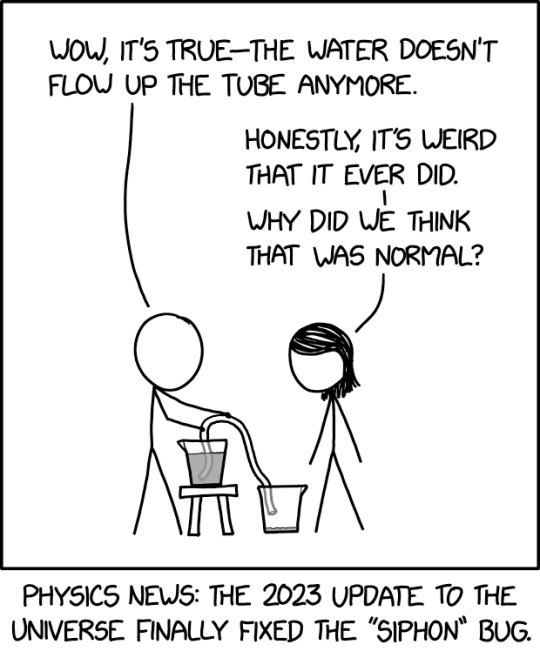
[Image ID XKCD #2775: Siphon. Man: ‘Wow, it’s true — the water doesn’t flow up the tube anymore.’ Woman: ‘Honestly, it’s weird that it ever did. Why did we ever think it was normal?’ Caption: ‘Physics news: the 2023 update to the universe finally fixed the ‘siphon’ bug.’]
My last foray into linkblogging was so great — and my backlog of links is already so large — that I’m doing another one.
Link the first: “Siphon,” XKCD’s delightful, whimsical “physics-how-the-fuck-does-it-work” one-shot (visit the link, the tooltip is great):
https://xkcd.com/2775/

[Image ID: A Dutch safety poster by Herman Heyenbrock, warning about the hazards of careless table-saw use, featuring a hand with two amputated fingers.]
Next is “Hoogspanning,” 50 Watts’s collection of vintage Dutch workplace safety posters, which exhibit that admirable Dutch frankness to a degree that one could mistake for parody, but they’re 100% real, and amazing:
https://50watts.com/Hoogspanning-More-Dutch-Safety-Posters
They’re ganked from Geheugenvannederland (“Memory of the Netherlands”):
https://geheugenvannederland.nl/
While some come from the 1970s, others date back to the 1920s and are likely public domain. I’ve salted several away in my stock art folder for use in future collages.
All right, now that the fun stuff is out of the way, let’s get down to some crunch tech-policy. To ease us in, I’ve got a game for you to play: “Moderator Mayhem,” the latest edu-game from Techdirt:
https://www.techdirt.com/2023/05/11/moderator-mayhem-a-mobile-game-to-see-how-well-you-can-handle-content-moderation/
Moderator Mayhem started life as a card-game that Mike Masnick used to teach policy wonks about the real-world issues with content moderation. You play a mod who has to evaluate content moderation flags from users while a timer ticks down. As you race to evaluate users’ posts for policy compliance, you’re continuously interrupted. Sometimes, it’s “helpful” suggestions from the company’s AI that wants you to look at the posts it flagged. Sometimes, it’s your boss who wants you to do a trendy “visioning” exercise or warning you about a “sensitivity.” Often, it’s angry ref-working from users who want you to re-consider your calls.
The card-game version is legendary but required a lot of organization to play, and the web version (which is better in a mobile browser, thanks to a swipe-left/right mechanic) is something you can pick up in seconds. This isn’t merely highly recommended; I think that one could legitimately refuse to discuss content moderation policies and critiques with anyone who hasn’t played it;
https://moderatormayhem.engine.is/
Or maybe that’s too harsh. After all, tech policy is a game that everyone can play — and more importantly, it’s a game everyone should play. The contours of tech regulation and implementation touch rub up against nearly every aspect of our lives, and part of the reason it’s such a mess is that the field has been gatekept to shit, turned into a three-way fight between technologists, policy wonks and economists.
Without other voices in the debate, we’re doomed to end up with solutions that satisfy the rarified needs and views of those three groups, a situation that is likely to dissatisfy everyone else.
However. However. The problem is that our technology is nowhere near advanced enough to be indistinguishable from magic (RIP, Sir Arthur). There’s plenty of things everyone wishes tech could do, but it can’t, and wanting it badly isnlt enough. Merely shouting “nerd harder!” at technologists won’t actually get you what you want. And while I’m rattling off cliches: a little knowledge is a dangerous thing.
Which brings me to Ashton Kutcher. Yes, that Ashton Kutcher. No, really. Kutcher has taken up the admirable, essential cause of fighting Child Sex Abuse Material (CSAM, which is better known as child pornography) online. This is a very, very important and noble cause, and it deserves all our support.
But there’s a problem, which is that Kutcher’s technical foundations are poor, and he has not improved them. Instead, he cites technologies that he has a demonstrably poor grasp upon to call for policies that turn out to be both ineffective at fighting exploitation and to inflict catastrophic collateral damage on vulnerable internet users.
Take sex trafficking. Kutcher and his organization, Thorn, were key to securing the passage of SESTA/FOSTA, a law that was supposed to fight online trafficking by making platforms jointly liable when they were used to facilitate trafficking:
https://www.engadget.com/2019-05-31-sex-lies-and-surveillance-fosta-privacy.html
At the time, Kutcher argued that deputizing platforms to understand and remove which user posts were part of a sex crime in progress would not inflict collateral damage. Somehow, if the platforms just nerded hard enough, they’d be able to remove sex trafficking posts without kicking off all consensual sex-workers.
Five years later, the verdict is in, and Kutcher was wrong. Sex workers have been deplatformed nearly everywhere, including from the places where workers traded “bad date” lists of abusive customers, which kept them safe from sexual violence, up to and including the risk of death. Street prostitution is way up, making the lives of sex workers far more dangerous, which has led to a resurgence of the odious institution of pimping, a “trade” that was on its way to vanishing altogether thanks to the power of the internet to let sex workers organize among themselves for protection:
https://aidsunited.org/fosta-sesta-and-its-impact-on-sex-workers/
On top of all that, SESTA/FOSTA has made it much harder for cops to hunt down and bust actual sex-traffickers, by forcing an activity that could once be found with a search-engine into underground forums that can’t be easily monitored:
https://www.techdirt.com/2018/07/09/more-police-admitting-that-fosta-sesta-has-made-it-much-more-difficult-to-catch-pimps-traffickers/
Wanting it badly isn’t enough. Technology is not indistinguishable from magic.
A little knowledge is a dangerous thing.
Kutcher, it seems, has learned nothing from SESTA/FOSTA. Now he’s campaigning to ban working cryptography, in the name of ending the spread of CSAM. In March, Kutcher addressed the EU over the “Chat Control” proposal, which, broadly speaking, is a ban on end-to-end encrypter messaging (E2EE):
https://www.brusselstimes.com/417985/ashton-kutcher-spotted-in-the-european-parliament-promoting-childrens-rights
Now, banning E2EE would be a catastrophe. Not only is E2EE necessary to protect people from griefers, stalkers, corporate snoops, mafiosi, etc, but E2EE is the only thing standing between the world’s dictators and total surveillance of every digital communication. Even tiny flaws in E2EE can have grave human rights concerns. For example, a subtle bug in Whatsapp was used by NSO Group to create a cyberweapon called Pegasus that the Saudi royals used to lure Jamal Khashoggi to his grisly murder:
https://www.theguardian.com/world/2021/jul/18/nso-spyware-used-to-target-family-of-jamal-khashoggi-leaked-data-shows-saudis-pegasus
Because the collateral damage from an E2EE ban would be so far-ranging (beyond harms to sex workers, whose safety is routinely disregarded by policy-makers), people like Kutcher can’t propose an outright ban on E2EE. Instead, they have to offer some explanation for how the privacy, safety and human rights benefits of E2EE can be respected even as encryption is broken to hunt for CSAM.
Kutcher’s answer is something called “fully homomorphic encryption” (FHE) which is a theoretical — and enormously cool — way to allow for computing work to be done on encrypted data without decrypting it. When and if FHE are ready for primetime, it will be a revolution in our ability to securely collaborate with one another.
But FHE is nowhere near the state where it could do what Kutcher claims. It just isn’t, and once again, wanting it badly is not enough. Writing on his blog, the eminent cryptographer Matt Green delivers a master-class in what FHE is, what it could do, and what it can’t do (yet):
https://blog.cryptographyengineering.com/2023/05/11/on-ashton-kutcher-and-secure-multi-party-computation/
As it happens, Green also gave testimony to the EU, but he doesn’t confine his public advocacy work to august parliamentarians. Green wants all of us to understand cryptography (“I think cryptography is amazing and I want everyone talking about it all the time”). Rather than barking “stay in your lane” at the likes of Kutcher, Green has produced an outstanding, easily grasped explanation of FHE and the closely related concept of multi-party communication (MPC).
This is important work, and it exemplifies the difference between simplifying and being simplistic. Good science communicators do the former. Bad science communicators do the latter.
While Kutcher is presumably being simplistic because he lacks the technical depth to understand what he doesn’t understand, technically skilled people are perfectly capable of being simplistic, when it suits their economic, political or ideological goals.
One such person is Geoffrey Hinton, the so-called “father of AI,” who resigned from Google last week, citing the existential risks of “runaway AI” becoming superintelligent and turning on its human inventors. Hinton joins a group of powerful, wealthy people who have made a lot of noise about the existential risk of AI, while saying little or nothing about the ongoing risks of AI to people with disabilities, poor people, prisoners, workers, and other groups who are already being abused by automated decision-making and oversight systems.
Hinton’s nonsense is superbly stripped bare by Meredith Whittaker, the former Google worker organizer turned president of Signal, in a Fast Company interview with Wilfred Chan:
https://www.fastcompany.com/90892235/researcher-meredith-whittaker-says-ais-biggest-risk-isnt-consciousness-its-the-corporations-that-control-them
The whole thing is incredible, but there’s a few sections I want to call to your attention here, quoting Whittaker verbatim, because she expresses herself so beautifully (sci-comms done right is a joy to behold):
I think it’s stunning that someone would say that the harms [from AI] that are happening now — which are felt most acutely by people who have been historically minoritized: Black people, women, disabled people, precarious workers, et cetera — that those harms aren’t existential.
What I hear in that is, “Those aren’t existential to me. I have millions of dollars, I am invested in many, many AI startups, and none of this affects my existence. But what could affect my existence is if a sci-fi fantasy came to life and AI were actually super intelligent, and suddenly men like me would not be the most powerful entities in the world, and that would affect my business.”
I think we need to dig into what is happening here, which is that, when faced with a system that presents itself as a listening, eager interlocutor that’s hearing us and responding to us, that we seem to fall into a kind of trance in relation to these systems, and almost counterfactually engage in some kind of wish fulfillment: thinking that they’re human, and there’s someone there listening to us. It’s like when you’re a kid, and you’re telling ghost stories, something with a lot of emotional weight, and suddenly everybody is terrified and reacting to it. And it becomes hard to disbelieve.
Whittaker sets such a high bar for tech criticism. I had her clarity in mind in 2021, when I collaborated with EFF’s Bennett Cyphers on “Privacy Without Monopoly,” our white-paper addressing the claim that we need giant tech platforms to protect us from the privacy invasions of smaller “rogue” operators:
https://www.eff.org/wp/interoperability-and-privacy
This is a claim that is most often raised in relation to Apple and its App Store model, which is claimed to be a bulwark against commercial surveillance. That claim has some validity: after all, when Apple added a one-click surveillance opt-out to Ios, its mobile OS. 96% of users clicked the “don’t spy on me” button. Those clicks cost Facebook $10b in just the following year. You love to see it.
But Apple is a gamekeeper-turned-poacher. Even as it was blocking Facebook’s surveillance, it was conducting its own, nearly identical, horrifyingly intrusive surveillance of every Ios user, for the same purpose as Facebook (ad targeting) and lying about it:
https://pluralistic.net/2022/11/14/luxury-surveillance/#liar-liar
Bennett and I couldn’t have asked for a better example of the point we make in “Privacy Without Monopoly”: the thing that stops companies from spying on you isn’t their moral character, it’s the threat of competition and/or regulation. If you can modify your device in ways that cost its manufacturer money (say, by installing an alternative app store), then the manufacturer has to earn your business every day.
That might actually make them better — and if it doesn’t, you can switch. The right way to make sure the stuff you install on your devices respects your privacy is by passing privacy laws — not by hoping that Tim Apple decides you deserve a private life.
Bennett and I followed up “Privacy Without Monopoly” with an appendix that focused on a territory where there is a privacy law: the EU, whose (patchily enforced) General Data Protection Regulation (GDPR) is the kind of privacy law that we call for in the original paper. In that appendix, we addressed the issues of GDPR enforcement:
https://www.eff.org/wp/interoperability-and-privacy#gdpr
More importantly, we addressed the claim that the GDPR crushed competition, by making it harder for smaller (and even sleazier) ad-tech platforms to compete with Google and Facebook. It’s true, but that’s OK: we want competition to see who can respect technology users’ rights — not competition to see who can violate those rights most efficiently:
https://www.eff.org/deeplinks/2021/06/gdpr-privacy-and-monopoly
Around the time Bennett and I published the EU appendix to our paper, I was contacted by the Indian Journal of Law and Technology to see whether I could write something on similar lines, focused on the situation in India. Well, it took two years, but we’ve finally published it: “Securing Privacy Without Monopoly In India: Juxtaposing Interoperability With Indian Data Protection”:
https://www.ijlt.in/post/securing-privacy-without-monopoly-in-india-juxtaposing-interoperability-with-indian-data-protection
The Indian case for interop incorporates the US and EU case, but with some fascinating wrinkles. First, there are the broad benefits of allowing technology adaptation by people who are often left out of the frame when tools and systems are designed. As the saying goes, “nothing about us without us” — the users of technology know more about their needs than any designer can hope to understand. That’s doubly true when designers are wealthy geeks in Silicon Valley and the users are poor people in the global south.
India, of course, has its own highly advanced domestic tech sector, who could be a source of extensive expertise in adapting technologies from US and other offshore tech giants for local needs. India also has a complex and highly contested privacy regime, which is in extreme flux between high court decisions, regulatory interventions, and legislation, both passed and pending.
Finally, there’s India’s long tradition of ingenious technological adaptations, locally called jugaad, roughly equivalent to the English “mend and make do.” While every culture has its own way of celebrating clever hacks, this kind of ingenuity is elevated to an art form in the global south: think of jua kali (Swahili), gambiarra (Brazilian Portuguese) and bricolage (France and its former colonies).
It took a long time to get this out, but I’m really happy with it, and I’m extremely grateful to my brilliant and hardworking research assistants from National Law School of India University: Dhruv Jain, Kshitij Goyal and Sarthak Wadhwa.
I don’t claim that any of the incarnations of the “Privacy Without Monopoly” paper rise to the clarity of the works of Green or Whittaker, but that’s okay, because I have another arrow in my quiver: fiction. For more than 20 years, I’ve written science fiction that tries to make legible and urgent the often dry and abstract concepts I address in my nonfiction.
One issue I’ve been grappling with for literally decades is the implications of “trusted computing,” a security model that uses a second, secure computer, embedded in your device, to observe and report on what your main computer is doing. There are lots of implications for this, both horrifying and amazing.
For example, having a second computer inside your device that watches it is a theoretically unbeatable way of catching malicious software, resolving the conundrum of malware: if you think your computer is infected and can’t be trusted, then how can you trust the antivirus software running on that computer.
Back in 2016, Andrew “bunnie” Huang and Edward Snowden released the “Introspection Engine,” a separate computer that you could install in an Iphone, which would tell you whether it was infected with spyware:
https://www.tjoe.org/pub/direct-radio-introspection/release/2
But while there are some really interesting positive applications for this kind of software, the negative ones — unbeatable DRM and tamper-proof bossware — are genuinely horrifying. My novella “Unauthorized Bread” digs into this, putting blood and sinew into an otherwise dry abstract and skeletal argument:
https://arstechnica.com/gaming/2020/01/unauthorized-bread-a-near-future-tale-of-refugees-and-sinister-iot-appliances/
Then there are applications that are somewhere in between, like “remote attestation” (when the secure computer signs a computer-readable description of what your computer is doing so that you can prove things about your computer and its operation to people who don’t trust you, but do trust that secure computer).
Remote attestation is the McGuffin of Red Team Blues, my latest novel, a crime-thriller about a cryptocurrency heist. The novel opens with the keys to a secure enclave — the gadget that signs the attestations in remote attestation — going missing.
When Matt Green reviewed Red Team Blues (his first book review!), he singled this out as a technically rigorous and significant plot point, because secure enclaves are designed so that they can’t be updated (if you can update an enclave, then you can update it with malicious software):
https://blog.cryptographyengineering.com/2023/04/24/book-review-red-team-blues/
This means that bugs in secure enclaves can last forever. Worse, if the keys for a secure enclave ever leak, then there’s no way to update all the secure enclaves out there in the world — millions or billions of them — to fix it.
Well, it’s happened.
The keys for the secure enclaves in Micro-Star International (AKA MSI) computers, a massive manufacturer of work and gaming PCs — have leaked and shown up on the “extortion portal” of a notorious crime gang:
https://arstechnica.com/information-technology/2023/05/leak-of-msi-uefi-signing-keys-stokes-concerns-of-doomsday-supply-chain-attack/
As a security expert quoted by Ars Technica explains, this is a “doomsday scenario.” That’s more or less how it plays in my novel. The big difference between the MSI leak and the hack in my book is that the MSI keys were just sitting on a server, connected to the internet, which wasn’t well-secured.
In Red Team Blues, I went to enormous lengths to imagine a fiendishly complex, incredibly secure scheme for hosting these keys, and then dreamt up a way that the bad guys could defeat it. I toyed with the idea of having the keys leak due to rank incompetence, but I decided that would be an “idiot plot” (“a plot that only works if the characters are idiots”). Turns out, idiot plots may make for bad fiction, but they’re happening around us all the time.
In my real life, I cross a lot of disciplinary boundaries — law, politics, economics, human rights, security, technology. I’m not the world’s leading expert in any of these domains, but I am well-enough informed about each that I’m able to find interesting ways that they fit together in a manner that is relatively rare, and is also (I think) useful.
I admit to sometimes feeling insecure about this — being “one inch deep and ten miles wide” has its virtues, but there’s no avoiding that, say, I know less about the law than a real lawyer, and less about computer science than a real computer scientist.
That insecurity is partly why I’m so honored when I get to talk to experts across multiple disciplines. 2023 was a very good year for this, thanks to University College London. Back in Feb, I was invited to speak as part of UCL Institute of Brand and Innovation Law’s annual series on technology law:
https://www.ucl.ac.uk/laws/events/2023/feb/recording-chokepoint-capitalism-can-it-be-defeated
And next month, I’m giving UCL Computer Science’s annual Peter Kirstein lecture:
https://www.eventbrite.co.uk/e/peter-kirstein-lecture-2023-featuring-cory-doctorow-registration-539205788027
Getting to speak to both the law school and the computer science school within a space of months is hugely gratifying, a real vindication of my theory that the virtues of my breadth make up for the shortcomings in my depth.
I’m getting a similar thrill from the domain experts who’ve been reviewing Red Team Blues. This week, Maria Farrell posted her Crooked Timber review, “When crypto meant cryptography”:
https://crookedtimber.org/2023/05/11/when-crypto-meant-cryptography/
Farrell is a brilliant technology critic. Her work on “prodigal tech bros” is essential:
https://conversationalist.org/2020/03/05/the-prodigal-techbro/
So her review means a lot to me in general, but I was overwhelmed to read her describe how Red Team Blues taught her to “read again for joy” after long covid “completely scrambled [her] brain.”
That meant a lot personally, but her review is even more gratifying when it gets into craft questions, like when she praises the descriptions as “so interesting and sociologically textured.” I love her description of the book as “Dickensian”: “it shoots up and down the snakes and ladders of San Francisco’s gamified dystopia of income inequality, one moment whizzing up the ear-poppingly fast elevator to a billionaire’s hardened fortress, the next sleeping under a bridge in a homeless encampment.”
And then, this kicker: “it’s a gorgeous rejection of the idea that long-form fiction is about individual subjectivity and the interior life. It’s about people as pinballs. They don’t just reveal things about the other objects they hit; their constant action and reaction reveals the walls that hold them all in.”
Likewise, I was thrilled with Peter Watts’s review on his “No Moods, Ads or Cutesy Fucking Icons” blog::
https://www.rifters.com/crawl/?p=10578%22%3Ehttps://www.rifters.com/crawl/?p=10578
Peter is a brilliant sf writer and worldbuilder, an accomplished scientist, and one of the world’s most accomplished ranters. He’s had more amazing ideas than I’ve had hot breakfasts:
https://locusmag.com/2018/05/cory-doctorow-the-engagement-maximization-presidency/
His review says some very nice and flattering things about me and my previous work, which is always great to read, especially for anyone with a chronic case of impostor syndrome. But what really mattered was the way he framed how I write villains: “The villains of Cory’s books aren’t really people; they’re systems. They wear punchable Human faces but those tend to be avatars, mere sock-puppets operated by the institutions that comprise the real baddies.”
One could read that as a critique, but coming from Peter, it’s praise — and it’s praise that gets to the heart of my worldview, which is that our biggest problems are systemic, not individual. The problem of corporate greed isn’t just that CEOs are monsters who don’t care who they hurt — it’s that our system is designed to let them get away with it. Worse, system design is such that the CEOs who aren’t monsters are generally clobbered by the ones who are.
So much of our outlook is grounded in the moral failings or virtues of individuals. Tim Apple will keep our data safe, so we should each individually decide to reward him by buying his phones. If Tim Apple betrays us, we should “vote with our wallets” by buying something else. If you care about the climate, you should just stop driving. If there’s no public transit, well, then maybe you should, uh, dig a subway?
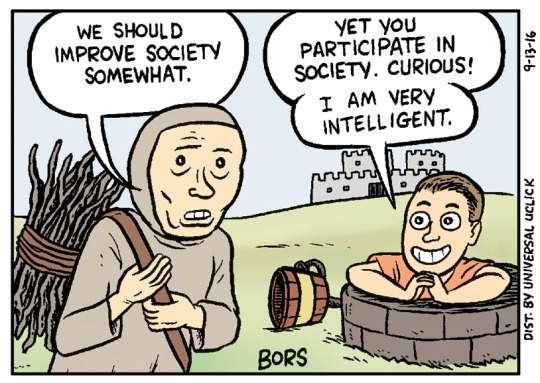
[Image ID: Matt Bors’s classic Mr Gotcha panel, in which a medieval peasant says ‘We should improve society somewhat,’ and Mr Gotcha replies, ‘Yet you participate in society. Curious! I am very smart.’]
This is the mindset Matt Bors skewers so expertly with his iconic Mr Gotcha character: “Yet you participate in society. Curious! I am very smart”:
https://thenib.com/mister-gotcha/
(Which reminds me, I am halfway through Bors’s unbelievably, fantastically, screamingly awesome graphic novel “Justice Warriors,” which turns the neoliberal caveat-emptor/personal-responsibility brain-worm into the basis for possibly the greatest superhero comic of all time:)
https://www.mattbors.com/books
Watts finishes his review with:
I’ve never fully come to terms with the general decency of Cory’s characters. Doctorow the activist lives in the trenches, fighting those who make their billions trading the details of our private lives, telling us that they own what we’ve bought, surveilling us for the greater good and even greater profits. He’s spent more time facing off against the world’s powerful assholes than I ever will. He knows how ruthless they are. He knows, first-hand, how much of the world is clenched in their fists. By rights, his stories should make mine look like Broadway musicals.
And yet, Doctorow the Author is — hopeful. The little guys win against overwhelming odds. Dystopias are held at bay. Even the bad guys, in defeat, are less likely to scorch the earth than simply resign with a show of grudging respect for a worthy opponent.
I often get asked by readers — especially readers of Pluralistic, which is heavy on awful scandals and corruption — how I keep going. Watts has the answer:
Maybe it’s a fundamental difference in outlook. I’ve always regarded humans as self-glorified mammals, fighting endless and ineffective rearguard against their own brain stems; Cory seems to see us as more influenced by the angels of our better natures. Or maybe — maybe it’s not just his plots that are meant to be instructional. Maybe he’s deliberately showing us how we could behave as a species, in the same way he shows us how to fuck with DRM or foil face-recognition tech. Maybe it’s not that he subscribes to some Pollyanna vision of what we are; maybe he’s showing us what we could be.
Got it in one, Peter.
And…
It’s also about what happens if we don’t get better.
Writing on his “Economics From the Top Down” blog, Blair Fix — a heterodox economist and sharp critic of oligarchy — publishes a Red Team Blues review that nails the “or else” in my books, and does it with graphs:
https://economicsfromthetopdown.com/2023/05/13/red-team-blues-cory-doctorows-anti-finance-thriller/
Fix surfaces the latent point in my work that inequality is destabilizing — that spectacular violence is downstream of making a society that has nothing to offer for the majority of us. As Marty Hench, the 67 year old forensic accountant protagonist of Red Team Blues says,
Finance crime is a necessary component of violent crime. Even the most devoted sadist needs a business model, or he will have to get a real job.
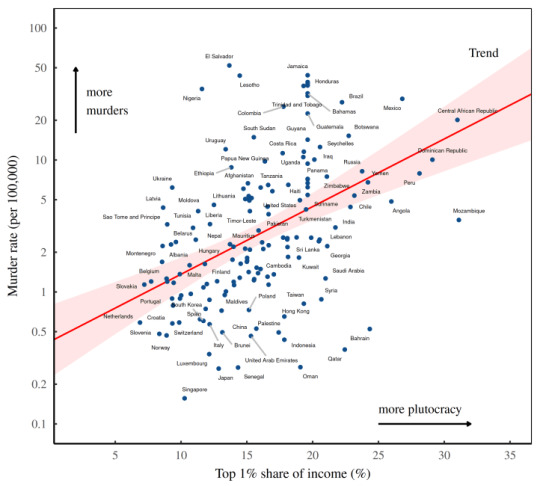
[Image ID: A chart labeled, ‘With more plutocracy comes more murder. As countries become more unequal (horizontal axis), their murder rates go up (vertical axis).’]
Fix agrees, and shows us that murders go up with inequality.
https://economicsfromthetopdown.com/2023/05/13/red-team-blues-cory-doctorows-anti-finance-thriller/#sources-and-methods
Which is why, while the average private eye is a kind of “cop who gets to bend the rules of policing”; Hench is “a kind of uber IRS agent who gets to work in ‘sneaky ways that aren’t available to the taxman.’”
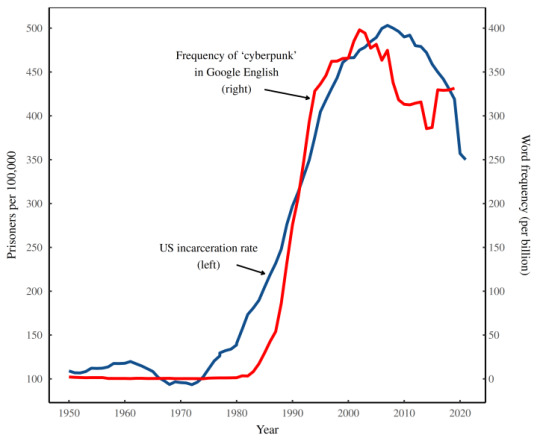
[Image ID: A chart labeled, ‘Was the US prison state the inspiration for cyberpunk? The term ‘cyberpunk’ (which describes a genre of dystopian science fiction) became popular in tandem with mass incarceration in the US. It’s probably not a coincidence.’]
This observation segues into a fascinating, data-informed look at the way that science fiction reflects our fears and aspirations about wider social phenomenon — for example, the popularity of the word “cyberpunk” closely tracks rising incarceration rates.
https://economicsfromthetopdown.com/2023/05/13/red-team-blues-cory-doctorows-anti-finance-thriller/#sources-and-methods
(It’s not a coincidence that the next Marty Hench book, “The Bezzle,” is about prisons and prison-tech; it’s out in Feb 2024:)
https://us.macmillan.com/books/9781250865878/thebezzle
I’m out on tour with Red Team Blues right now, with upcoming stops in the DC area, Toronto, the UK, and then Berlin:
https://craphound.com/novels/redteamblues/2023/04/26/the-red-team-blues-tour-burbank-sf-pdx-berkeley-yvr-edmonton-gaithersburg-dc-toronto-hay-oxford-nottingham-manchester-london-edinburgh-london-berlin/
I’ve just added another Berlin stop, on June 8, at Otherland, Berlin’s amazing sf/f bookstore:
https://twitter.com/otherlandberlin/status/1657082021011701761
I hope you’ll come along! I’ve been meeting a lot of people on this tour who confess that while they’ve read my blogs and essays for years, they’ve never picked up one of my books. If you’re one of those readers, let me assure you, it is not too late!
As you’ve read above, my fiction is very much a continuation of my nonfiction by other means — but it’s also the place where I bring my hope as well as my dismay and anger. I’m told it makes for a very good combination.
If you’re still wavering, maybe this will sway you: the blogging and essays are either free or very low-paid, and they’re heavily subsidized by my fiction. If you enjoy my nonfiction, buying my novels is the best way to say thank you and to ensure a continuing supply of both.
But novels are by no means a dreary duty — fiction is a delight, and after a couple decades at it, I’ve come to grudgingly concede — impostor syndrome notwithstanding — that I’m pretty good at it.
I hope you’ll agree.
Image: Robert Miller (modified) https://www.flickr.com/photos/12463666@N03/52721565937
CC BY 2.0 https://creativecommons.org/licenses/by/2.0/

Catch me on tour with Red Team Blues in Toronto, DC, Gaithersburg, Oxford, Hay, Manchester, Nottingham, London, and Berlin!


[Image ID: A kitchen junk-drawer, full of junk.]
#illustration#pluralistic#hand-waving#multi-party computation#linkdump#link-blogging#red team blues#uefi#supply chain attacks#xkcd#brain fog#say cyber again#privacy without monopoly#reviews#crypto-wars#inequality#social instability#blair fix#maria farrell#dicksenian#msi#villains#peter watts#global south#bennett cyphers#eff#data protection#content moderation#content moderation at scale#content moderation at scale is impossible
22 notes
·
View notes
Text
he’s feeling GOOD!
#Belphegor#I remember when Pangur and Grim were kittens I’d have to wave about a wand in one hand while i did my work#and now we’re back to the same routine with Belphie
2K notes
·
View notes
Text
I think if I could be the kind stranger in someone’s memory, that’d be enough.
#sometimes I really sit and think about how much impact the sweet strangers in my life have had on me#thatve helped me keep going without ever knowing just how fucking miserable I was before them#like how can I ever repay the family that drew pictures and left them at my door as an apology for all the noise#the man who held the train door for me even after I slowed down bc I didn’t think I’d make it#the girl who held my hand at the beach because the waves were too strong for both of us to stand on our own#the nurse that charged my phone when I was at the hospital#like????#humans are good actually#hopecore#hopepunk#the indomitable human spirit
6K notes
·
View notes
Text
"The Dalish gifted an Eluvian to the Grey Wardens so we can get in Weisshaupt" is just so emblematic of my problems with the game, because you can tell--it feels to me--that the thought process was "We need to have an Eluvian in Weisshaupt, Eluvians are an Elven(TM) thing, the Dalish are the Elven(TM) faction, so let's just say they were the ones who gave one to the Grey Wardens".
The Dalish have been established over all three games as a people who have spent the last thousands of years desperately scrounging for whatever scraps of their culture they can find, a struggle that has cost them dearly as typified by Merrill's plight trying to restore a single Eluvian which had previously Blighted two of her clan mates (an Eluvian that she can't open or use, and doesn't actually know what it's for by the end of her quest line). Multiple Dalish in Inquisition are killed trying to regain their history ("The Knight's Tomb") or trying to prove themselves by regaining even a talisman related to their culture ("Someone to Lose"). They are an insular and guarded people because outsider interactions frequently invoke a heavy toll in Dalish lives, up to and including entire clans. And yet, we are supposed to believe in a single throwaway piece of dialogue that in the 10 years between Inquisition and Veilguard, the Dalish have (offscreen) gained enough access to Eluvians as a piece of technology that they can afford to just "gift" one to the Grey Wardens without explanation.
There are constant revelations of this kind where pre-established parts of the lore are just thrown out the window. Things that had great emotional weight or impact in previous installments of the series are used for cheap thrills or plot-hole fills without explanation, justification, or even gravitas from the game. You have a moment in one of Emmrich's quests where you stumble through a portal directly into the Fade that Hezenkoss opened in Blackthorne manor, and you're tasked with closing it again. All of this is done entirely without the Anchor or even an implied blood sacrificial ritual, and it is never commented as anything particularly groundbreaking (when going into the Fade physically through tearing a hole in it was a Big Fucking Deal in Inquisition). You encounter a Compassion spirit in a side quest investigating the deaths of citizens in Tevinter who were murdered by a demon of Despair, and it is strong enough to not only retain itself through sensing the (unanswered!) suffering that these people experienced, but it also resolves to protect others to keep them from the same fate (when Cole was so traumatized by a single person's death that he completely reshaped his entire being around them). So on and so forth. Don't even get me started on Bellara's comment that the ancient elves "made most of their buildings in the Fade".
I'm not asking for someone to hold my hand and spoonfeed me information. I frankly don't care if an obscure codex entry, a reddit AMA question, bluesky tweet, or headcanon exists somewhere to patch in or bandaid over all of the jarring details like this, because it doesn't change the fact that the game itself should be doing this. The game itself should be taking the time to explain this in a way that is not missable, the game itself should be taking these things seriously, it should recognize when it is doing contradictory things and rush to justify itself accordingly, because these are things the emotional beats of previous stories hinged on. Like, when the game has Taash say a line like "The Qun isn't a prison, you can leave if you want", it's the responsibility of the writers to show that this is Taash being misinformed, not because I'm too stupid to headcanon that this is the case, but because this line is a symptom of how the entire game's writing seems to have forgotten about the Ben-Hassrath as a thing that exists in this setting.
Previous Dragon Age games are no stranger to "We quietly removed Solas' network of agents and spies offscreen"-style writing, but it usually didn't feel like a constant deluge periodically uprooting my emotional investment and immersion. There's only so much I can take in good faith before I realize that this game was just not written with any care towards ensuring that the worldbuilding made sense and felt right to the player, leading to awkward backpedaling in reddit threads like "no the Crows haven't changed as an organization, these are just the unique Good Crows and we forgot to mention it".
I just can't look past this shit anymore.
#this is not what i made my blog for#so i won't say anything else#waving hello to my single follower#you and me we're holding hands in hell together#veilguard critical
1K notes
·
View notes
Text



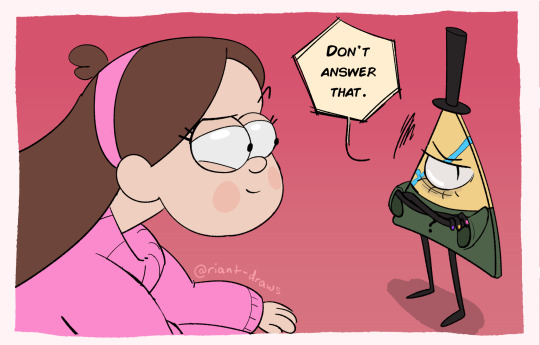
handyman bill au really eating my brain for breakfast (au by @ waty_mot & @ LosanPostle on X — @ handymanbill on here)
#gravity falls#the book of bill#handyman bill au#gravity falls au#gravity falls fanart#bill cipher#mabel pines#riantart#i like to think they'd be besties#he doesn't even have nails but nothing stops mabel#ik she's older in the au but *waves hands*#(NOT ship art... *sigh* internet)
2K notes
·
View notes
Note
You can’t pick Lilia for this. But who is your other favorite short character in Twst?



I like the angry little king boy 🌹
#art#twisted wonderland#sorry epel and ortho i like you guys a lot too!#oh and grim i guess#wait how many other shorties are there in twst#anyway i have a lot of affection for episode 1 and for riddle's character arc#he is a terrible little bastard who is trying very hard to be a slightly less terrible little bastard#and i have feelings about his friendships with trey and cater and che'nya especially!#and how that relates to his upbringing and his dumpster fire of a mom and uhhhhhh you know. everything.#i don't know how to do the words about all the thoughts i have on fictional characters#me waving my hands frantically in the air: it's about LOVE and wanting to be LOVED this is what twst is ABOUT --#(i am dragged bodily offstage by my collar)
5K notes
·
View notes
Text
cannot emphasize enough how utterly life changing it is to witness people be wild dog horny over bodies that look like mine

#butch#dyke#trb.txt#butchposting#waves hands it's like. you know. wow. it's really cool. life changing
2K notes
·
View notes
Text





Nice night 🌘
#fuyuhiko kuzuryu#hajime hinata#kazuichi souda#akane owari#sonia nevermind#sdr2#super danganronpa 2#danganronpa 2#danganronpa#an art#Me drawing this at 8 in the morning:#I was drawing this after working on the fic a bit. I'm struggling....but trying.... !!!!!!!#Please for the love of God don't focus on the hand size changing. You think u can keep track of that???#Edit: the final chapter is almost done. I drew this as a comfort before All That lol so. Enjoy#Me after writing: ...... and then it was all a bad dream the end :)#Vi if you see this. I'm waving. Tysm for your hard work#Polyremnants
3K notes
·
View notes
Text
Going Home
youtube
Also I have a Youtube Channel now??? It's just to post Animations and Speedpaints on for now so yeah!!
#in stars and time#isat#in stars and time siffrin#isat siffrin#isat mirabelle#isat odile#isat isabeau#isat bonnie#in stars and time isabeau#in stars and time mirabelle#in stars and time bonnie#in stars and time odile#in stars and time petronille#isat petronille#animation#asil and art#I'm so happy I was able to finish it before Siffrin's Birthday#posting it earlier because I know next week the tag will swallow this video which uhm will suck because#waves my hands around#this was a lot of work#been chipping away at this for 3 months and fixing it#if you see a mistake no you don't#anyway I hope they get home someday
2K notes
·
View notes
Text


So... heat waves are fun (not)
(Bonus : Mama Jamil)
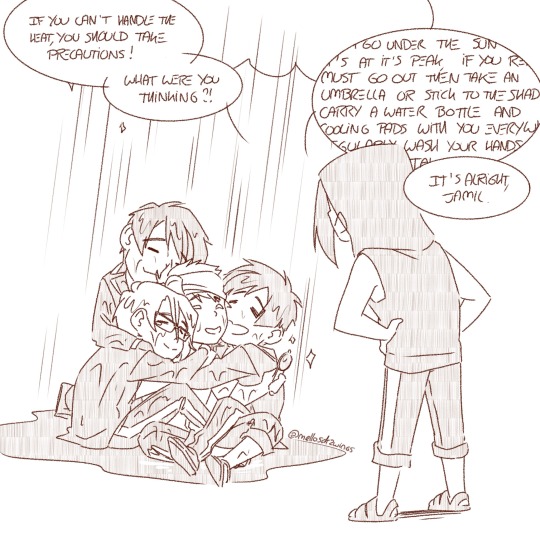
#i can handle the heat#but my skin is paler than a nun's butt#i can't go out under the sun without spontaneously combusting!#Jamil's rambling is made for laughs but he's actually right#don't go out at peak sunlight hours#if you really need to go out take an umbrella and cover your head!#especially if you have thin hair#always carry a water bottle with you#cooling pads are your friends if you can afford them#washing your hands; feet; and face helps lower your own temperature#dont hesitate to make a foot bath if you're at home#if you have fans you can put a bowl of ice in front of it to blow cold air#when I draw during a heat wave I have a foot bath and a humid towel on my shoulders#that's all for PSA!#mello's drawings#twisted wonderland#twst#azul ashengrotto#jade leech#floyd leech#jamil viper#kalim al asim#art#my art#heat wave
3K notes
·
View notes
Text


Leviathan and Cerberus with their lil Husband
I do have like a more complex design for both of em but I got sick and I really wanna draw some cute sticker stuff for my computer hhhh
#genshin impact#neuvillette#wriothesley#wriolette#wriollette#neuvithesley#myart#i cant really make more obvious shippy sticker for -waves hand at my country- reasons#but these ended up lookin so cute
4K notes
·
View notes
Text



developed a sudden and urgent fancy for royhavocai
#and promptly feverishly filled three silly little canvases about it#fullmetal alchemist#fullmetal alchemist brotherhood#roy mustang#riza hawkeye#jean havoc#royhavocai#jeanroyai#(??)#havoroyai#(??????)#havocai#royai#royhavoc#fma#fmab#long post //#incidentally i tried to have a look in their supposed tag(s)#let's just say.. i guess this one goes out to all of you [waving my hands like a dj to a sandy stretch of empty space]#i did leaf through the fma artbook i bought recently (really nice btw) and u know they're together a lot. arakawa likes them too.#my little designer brainpet is not completely unsupported. they're sooo standing next to each other and stuff
5K notes
·
View notes
Text
I've seen a lot of people writing Danny as a space ancient and Dan and Dani as ghosts with moon and sun cores, being sort of parts, versions of Danny and therefore weaker. Now, consider: Dan and Dani are both powerful ghosts with really cool cores and stuff but Danny is just some guy™
Dan, who came from an alternate timeline and is kind of from the future but also not, is Clockwork's apprentice and will eventually become an ancient of time. He probably only agreed to have some lessons with Clockwork to understand better what happened to him, but he enjoys his apprenticeship now.
Dani, with her love of travelling, loves seeing all the different places the world offers to her, and that includes space and different planets and maybe even parallel universes, and she accidentally ends up being an apprentice of the space ancient. For now she's probably a baby ancient of freedom or something like that, but she might become an ancient of space in the future.
We can also have something like Dan having a core of destruction or Dani being the Speed Force if you want it to be dcxdp, or any headcanon of yours about their cool powers.
And then there's Danny. And yeah, everyone knows that he's super powerful, but also he's just some guy.
It can go different routes. Does everyone know that Danny is just Danny? Or do they think that with siblings (well, technically a clone and an alternate version, but whatever) so powerful, he must be even stronger? Is Danny actually something terrifyingly eldritch and ancient and strong, almost a god, but he just doesn't know himself? Or is he just really some guy?
Now, because it's obvious that I have a dcxdp brainrot, have a regular "JL summons/meets a powerful ghost" but its Dan and Dani, and they keep mentioning their original/brother who won a fight against them at some point. The JL is very concerned about Dan and Dani's godlike powers, and they can't imagine what Danny is like. And then they meet him (in his human form), and it's just a young adult in casual clothes, very friendly and helpful, with no evident powers. Imagine the confusion. Imagine Dan and Dani, radiating power, in their eldritch ghost forms, admitting that fighting Danny for real is the dumbest thing to do and not even they would succeed... And then there's Danny is jeans and silly t-shirt, waving shyly.
#DO YOU SEE MY VISION#please#I'm not getting enough sleep#my brain is obsessed with weird stuff#I want Sam who barely looks human because she's one with nature#I want Tucker who looks regal and dangerous in his pharaoh clothes#I want Dan look like he can destruct the Earth with a wave of his hand#I want Dani who is everything there is in the world and you feel it in your bones#I want Jazz who sees your soul and your mind and you know it and there's nowhere to run#I want JL to meet all of them before meeting Danny#I want all of them to admit in their different ways that Danny is the greatest of them#I want JL to be VERY worried about meeting Danny#and then I want Danny to be as normal and friendly as possible#and I want him to treat all those eldritch creatures (his family and friends) as they're regular humans and nothing is weird about them#just hugs and love and praises#because it would cause so much confusion#this is NOT ghost king Danny#unless it is but he doesn't know (and either no one knows or no one told him because it's funnier this way and he's super oblivious)#dpxdc#dcxdp#dp x dc#dc x dp#DPxDC#DCxDP#danny phantom#isn't a crossover if you don't want it to be#could be any crossover if you do want it to be
2K notes
·
View notes
Text

i hope he's doing okay in spain, or whatever.
#malevolent podcast#malevolent#detective noel#charlie dowd#malevolent noel#king in yellow#tagged because hes vaguely hinted at (waves hands)#my art#SIGHHHHH this almost killed me nglty#and im tired of dwelling on it!!! stop being so hard on ur own art @ me!!!#no watermark bcuz i live on the edge i guess
527 notes
·
View notes
Text
Danny Phantom as a show is so funny because they literally say in the intro that it's about a guy with ghost powers who is part ghost because of a lab accident and the half-ghost fights other ghosts that are confirmed to be dead people, and then it expects you to not think any further on that
#danny phantom#from my knowledge they don't even try to hand wave it away in canon. they just kind of. don't address it#“ghost zone” literally just the in-universe afterlife what the h e c k
2K notes
·
View notes
Text










WOOF. UHM HELLO! this one is a long one! Quite the scroll! It is actually only *half* of the larger comic. I'm not done coloring it yet - but I finished all the inking. (alt desc. provided!)
Please stay tuned for the rest! I'm like kind of deranged over this whole comic and have put possibly way too much thought into everything about it. PART 1 (here!) | PART 2 (DONE!)
#bruce wayne#tim drake#batman#dc robin#batman and robin#dc#batman fanart#dp/dc#technically?#like barely qualifies - but phantom *is* there for a few seconds. he's more a plot device than an active part#after this it actually completely stops being about him#but trust i have WAY more opinions on a very specific dp/dc au#as a childhood fan of both I've got tons of opinions and ideas on it LOL#anyway. waves hand#this has been a blast to work on#i got to try a whole bunch of new techniques and the compositions were cool to plot out#especially since i had *such* a strong idea already of the final colors and how i was going to put it all together#the full thing is 19 pages - and like 400 words? iirc#homegrown art#traditional art#inking
503 notes
·
View notes